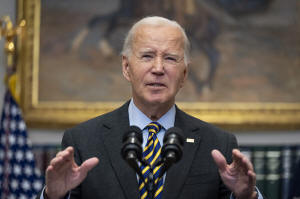Biden's administration proposes new rules on exporting AI chips,
provoking an industry pushback
 Send a link to a friend
Send a link to a friend
 [January 14, 2025] By
JOSH BOAK and MATT O'BRIEN [January 14, 2025] By
JOSH BOAK and MATT O'BRIEN
WASHINGTON (AP) — The Biden administration is proposing a new framework
for the exporting of the advanced computer chips used to develop
artificial intelligence, an attempt to balance national security
concerns about the technology with the economic interests of producers
and other countries.
But the framework proposed Monday also raised concerns of chip industry
executives as well as officials from the European Union over export
restrictions that would affect 120 countries. Mexico, Portugal, Israel
and Switzerland are among the nations that could have limited access to
chips needed for AI data centers and products, though much of the
underlying focus is aimed at China.
“If it’s China and not the United States determining the future of AI on
the planet, I think that the stakes of that are just profound," said
White House national security adviser Jake Sullivan on Monday.
With just a week before President-elect Donald Trump takes office, Biden
officials made clear it would be up to Trump to follow through with or
drop an approach that Sullivan said “shouldn’t be a partisan issue at
all."

Commerce Secretary Gina Raimondo said that it's “critical” to preserve
America's leadership in AI and the development of AI-related computer
chips. Fast-evolving AI technology enables computers to produce novels,
make scientific research breakthroughs, automate driving and foster a
range of other transformations that could reshape economies and warfare.
Raimondo said the framework “is designed to safeguard the most advanced
AI technology and ensure that it stays out of the hands of our foreign
adversaries but also enabling the broad diffusion and sharing of the
benefits with partner countries.”
While the Biden administration had already restricted exports to
adversaries such as China and Russia, some of those controls had
loopholes and the new rule would set limits on a much broader group of
countries. Data centers built in the Middle East and Southeast Asia are
of particular concern to U.S. officials, said Ed Mills, an analyst at
Raymond James.
“Chinese companies have used those data centers to build AI models with
technology that they would not be able to import to China itself,” Mills
said.
A tech industry group, the Information Technology Industry Council,
warned Raimondo in a letter last week that a hastily implemented new
rule from the Democratic administration could fragment global supply
chains and put U.S. companies at a disadvantage. Another group, the
Semiconductor Industry Association, said Monday it was disappointed that
the policy was being “rushed out the door” before a presidential
transition.
“The new rule risks causing unintended and lasting damage to America’s
economy and global competitiveness in semiconductors and AI by ceding
strategic markets to our competitors,” said SIA President and CEO John
Neuffer.
One industry executive, who is familiar with the framework and insisted
on anonymity to discuss it, said the proposed restrictions would limit
access to chips already used for video games, despite claims made
otherwise by the government. The executive said it would also limit
which companies could build data centers abroad.

Among those expected to be affected was the China-based data center
developer GDS Holdings. Its stock dropped more than 18% Monday.
Because the framework includes a 120-day comment period, the incoming
Republican administration could ultimately determine the rules for the
sales abroad of advanced computer chips designed mostly by California
companies like Nvidia and AMD.
Government officials said they felt the need to act quickly in hopes of
preserving what is perceived to be America's six- to 18-month advantage
on AI over rivals such as China, a head start that could easily erode if
competitors were able to stockpile the chips and make further gains.
Ned Finkle, vice president of external affairs at Nvidia, said in a
statement that the prior Trump administration had helped create the
foundation for AI's development and that the proposed framework would
hurt innovation without achieving the stated national security goals.
[to top of second column] |

President Joe Biden speaks in the Roosevelt Room at the White House
in Washington, Friday, Jan. 10, 2025. (AP Photo/Ben Curtis, File)
 “While cloaked in the guise of an
‘anti-China’ measure, these rules would do nothing to enhance U.S.
security,” he said. “The new rules would control technology
worldwide, including technology that is already widely available in
mainstream gaming PCs and consumer hardware.”
Under the framework, roughly 20 key allies and partners would face
no restrictions on accessing chips, but other countries would face
caps on the chips they could import, according to a fact sheet
provided by the White House.
The allies without restrictions include Australia, Belgium, Canada,
Denmark, Finland, France, Germany, Ireland, Italy, Japan, the
Netherlands, New Zealand, Norway, South Korea, Spain, Sweden, Taiwan
and the United Kingdom. But the limits to other countries within the
European Union raised objections from EU officials Monday who said
selling advanced AI chips to EU members represents an economic
opportunity for the U.S. and “not a security risk.”
Sullivan stressed that the framework would ensure that the most
cutting-edge aspects of AI would be developed within the United
States and with its closest allies, instead of possibly getting
offshored such as the battery and renewable energy sectors.
Users outside of these close allies could purchase up to 50,000
graphics processing units per country. There would also be
government-to-government deals which could bump up the cap to
100,000 if their renewable energy and technological security goals
are aligned with the United States.
Institutions in certain countries could also apply for a legal
status that would let them purchase up to 320,000 advanced graphics
processing units over two years. Still, there would be limits as to
how much AI computational capacity could be placed abroad by
companies and other institutions.
Also, computer chip orders equivalent to 1,700 advanced graphics
processing units would not need a license to import or count against
the national chip cap, among the other standards set by the
framework. The exception for the 1,700 graphics processing units
would likely help to meet the orders for universities and medical
institutions, as opposed to data centers.

The new rules are not expected to hinder the AI-driven data center
expansion plans of leading cloud computing providers such as Amazon,
Google and Microsoft because of exemptions for trusted companies
seeking large clusters of advanced AI chips.
“We’re confident we can comply fully with this rule’s high security
standards and meet the technology needs of countries and customers
around the world that rely on us,” said Brad Smith, Microsoft’s
president, in a statement Monday.
Microsoft drew bipartisan scrutiny last year after it announced a
$1.5 billion investment in a technology firm based in the United
Arab Emirates and overseen by the country’s powerful national
security adviser.
Biden leaving the ultimate decision to Trump will force the incoming
administration to clarify how tough it will be in countering China's
AI ambitions.
While some Trump allies such as U.S. Sen Ted Cruz have already
criticized the Biden approach as heavy-handed, Mills said it fits
into a broader U.S.-China trade policy that Trump himself began
eight years ago.
“This really started under Trump, continued under Biden, and the
Biden team advanced a lot of things, but they weren’t quite done
with some stuff,” Mills said. “It seems as if they’ve dropped a hot
potato into the Trump administration’s lap and almost dared them to
walk it back.”
——
O'Brien reported from Providence, Rhode Island.
All contents © copyright 2024 Associated Press. All rights reserved
 |